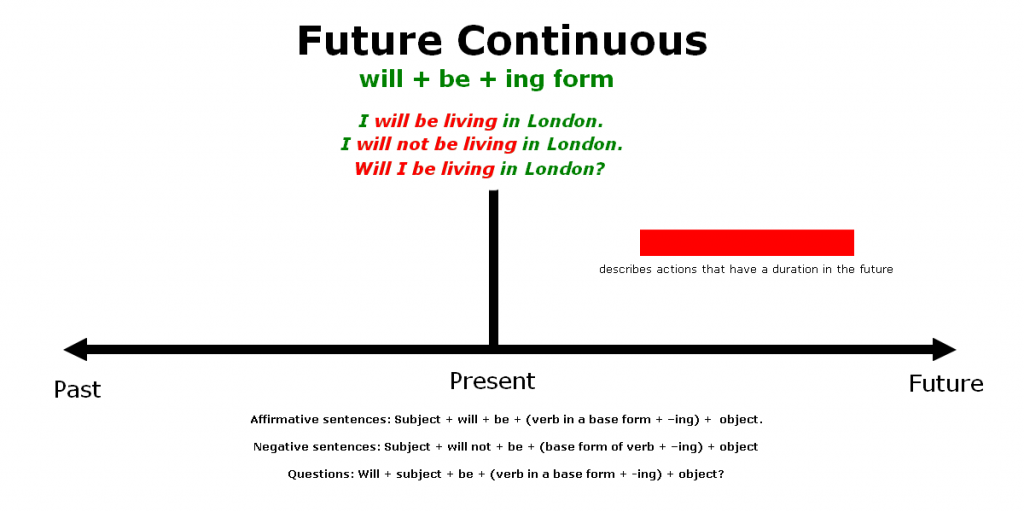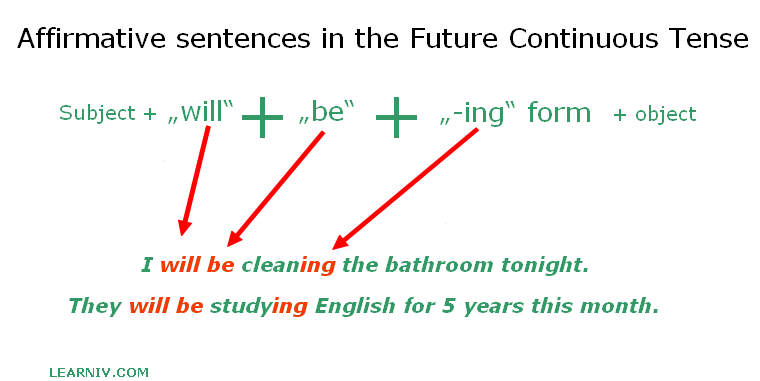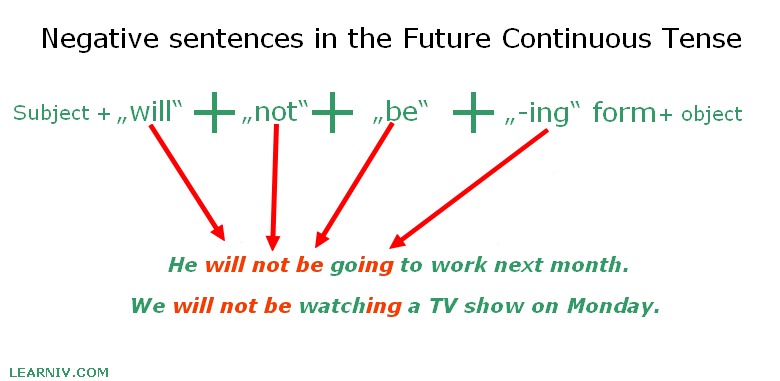The future progressive/future continuous tense expresses events taking place in the future and is especially used for events that have a duration.
This tense is very similar to the other progressive tenses which also use the progressive aspect with the suffix -ing. Although this tense is not used very often in English, it is still useful to know.
Look at the future continuous tense examples.
The future progressive tense form
In total, this tense consists of three basic parts. The key verbs are the verb WILL, the verb BE and the main verb in its continuous form (i.e., the base form with the suffix -ing). The form of the main verb in this form is called the present participle.
Thus, the general form of verbs in the future continuous tense will be:
will + be + verb (-ing)
When is the future continuous tense used?
While the future continuous tense is not very often used in practice, it usually refers to events in the future that will take place at some point.
Plans
The most common use of this tense is to express future plans. The future simple tense can also be used in place of the future continuous tense as both will express the same action and have the same meaning.
Example:
- I will be living in London.
- I will live in London.
Both sentences express the same information, that I will live in London, so it doesn’t matter which tense is used.
Emphasis on the duration of an action
When there is a need to emphasize the duration of an action and point it out, the future continuous tense is used. The exact time interval during which the action lasts is always given.
Example:
- I will be running for 2 hours!
- She will be learning from 6 to 8 PM.
Continuation of an action
We also use this tense to express events that are already in progress and which we expect to continue for some time. These sentences usually contain words such as “still”.
Example:
- I will still be doing this homework for perhaps another 2 hours.
- She will still be cleaning the house.
Future events
If we know exactly when in the future the event in question will occur, we use this tense. Keep in mind that it is only used if we can undeniably say that we are going somewhere at a certain point in time.
Example:
- Tomorrow at this time I will be sitting in a train.
- On Tuesday at 4 PM I will be learning Spanish.
Imagining the future or making assumptions
If we have an idea or assume some course of future events, we use this tense. These sentences usually contain words such as “think”, “guess”, “maybe” or “probably”.
Example:
- I think he will be dating her.
- I guess you will be very tired after the 10 km run.
A polite way of asking
The future continuous tense is also used to form polite questions. When you use this tense in a question, you appear more serious and polite.
Example:
- Will you be joining us?
- Will she be sleeping in our flat?
- Will they be bringing him to paintball?
Affirmative sentences
Affirmative sentences in the future continuous tense are formed by using the auxiliary verb “will be” and the present participle of a verb with the suffix -ing. As with the future simple tense, there is no need to differentiate between the person or number of subjects. The same standard rule applies to each subject since we always use the form “will be + verb(-ing)”.
The form of affirmative sentences will therefore be as follows:
Subject + will + be + verb(-ing) + object.
Example:
- I will be cleaning the bathroom tonight.
- She will be driving to Washington at this time tomorrow.
- They will be studying English for 5 years this month.
Negative sentences
By simply adding the negation “not” right after the verb “will”, we get negative sentences. As is the case with affirmative sentences, there is no need to differentiate between any pronouns.
The sentence structure will look like this:
Subject + will + not + be + verb (-ing) + object.
Example:
- He will not be going to work next month.
- We will not be watching a TV show on Monday.
- They will not be sleeping until 11 AM tomorrow.
Questions
Forming questions is just a matter of changing the word order a little. In fact, the auxiliary verb “will” is always placed at the beginning of interrogative sentences and is immediately followed by the subject and the verb “be” in its base form. The rest of the sentence takes on the same form as affirmative sentences.
The structure of questions is as follows:
Will + subject + be + verb (-ing) + object?
Example:
- Who will be joining us tonight?
- How will you be going there?
- Will she be coming tomorrow?
The difference between the continuous and simple future tense
The main difference between these two tenses is the description of the course of events. While the future continuous tense expresses events in the future with some duration, the simple future tense is usually used to describe sudden or non-long-term activities.
Example 1:
- I will learn at 6 PM. (I will start learning at 6 PM.)
- I will be learning at 6 PM. (At 6 PM learning will already be underway, so it will start earlier than 6 PM)
Example 2:
- She will bake a cake when you leave the house. (She will start baking a cake as soon as you leave the house.)
- She will be baking a cake when you leave the house.
Abbreviations of the verb WILL
The verb WILL, like other auxiliary verbs, has an abbreviation which allows you to have a smoother and faster conversation. Abbreviations render sentences more light-hearted and are most suited when talking to friends or loved ones.
The important thing to remember is to never use any abbreviations in formal conversations or during conversations with respected persons as this could come across as rude or even disrespectful. Therefore, it is better to avoid abbreviations entirely in such conversations.
Abbreviation WILL
The verb WILL is abbreviated with “‘ll”, apostrophe included. It is added to the subject to form one word.
- I will be doing that. –> I’ll be doing that.
- She will be living in the UK. –> She’ll be living in the UK.
- They will be watching TV. –> They’ll be watching TV.
Abbreviation WILL NOT
In negative sentences, the abbreviation of the verb WILL NOT is “won’t” and is added after the subject.
- They will not be listening to this music. –> They won’t be listening to this music.
- She will not be going out with her tomorrow. –> She won’t be going out with her tomorrow.
- I will not be ironing laundry this week. –> I won’t be ironing laundry this week.




